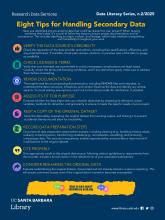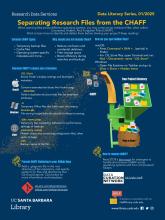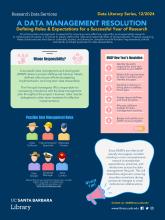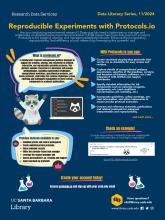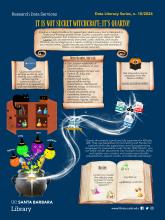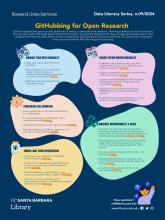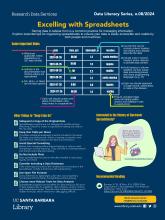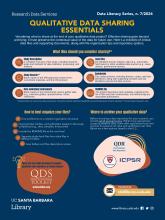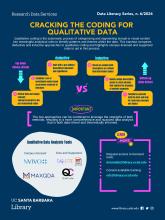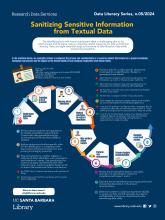A monthly series of infographics on research data
Published by the Library's Research Data Services (RDS) department, the Data Literacy Series (DLS) are visually-compelling one-page handouts that break down complex and important data-related topics. DLS complement the RDS's instructional efforts and mission to promote data education and research data management practices. The handouts are distributed under a CC BY-NC-SA 4.0 license. If you’d like to suggest a topic for an upcoming issue, please submit your feedback to rds@library.ucsb.edu.
Sign up for our Data Literacy Series and receive the infographics straight to your inbox!
Search the DLS handouts:
Eight Tips for Handling Secondary Data
Have you identified any pre-existing data that could be relevant to your project? When reusing someone else's data, it's crucial to follow key steps to ensure proper documentation and its provenance. This includes detailing its origin, context, and lineage, which helps maintain transparency and traceability throughout your work.
PDF - ALTTAGS: Data Analysis, Data Documentation, Data Reuse
DATE: 02-2025
Separating Research Files from the CHAFF
When opening files across different operating systems, you may come across irrelevant files, often called Concealed, Hidden, And Forgotten Files (CHAFF). Want to learn how to identify and delete them before sharing your project? Keep reading!
PDF - ALTTAGS: Data Sharing, File Management, Project Organization
DATE: 01-2025
A Data Management Resolution: Defining Roles & Expectations for a Successful Year of Research
Prioritizing data management is essential for ensuring more effective, impactful, and responsible research. In collaborative projects, it is critical to clearly define the roles and responsibilities of all participants. Properly assigning these duties ensures that data is collected, stored, and shared in compliance with funders’ requirements, ethical standards, and best practices for data stewardship.
PDF - ALTTAGS: Data Management, Project Organization
DATE: 12-2024
Reproducible Experiments with Protocols.io
Are you conducting experimental research? Does your lab need a better way to manage and collaborate on detailed experiment documentation? UCSB researchers have free premium access to Protocols.io for creating, sharing, and managing detailed protocols. Enhance the transparency, reproducibility, and efficiency of your research by leveraging this powerful tool!
PDF - ALTTAGS: Documentation, Metadata, Methods, Reproducibility
DATE: 11-2024
It's is not Secret Witchcraft, it's Quarto!
Imagine a magical toolbox for researchers, where every tool is designed to make your findings sparkle! Enter Quarto: a dynamic, open-source publishing system that transforms how you report your research. With Quarto, you can seamlessly blend text, code, citations, and visuals. Whether you’re whipping up a report, crafting a presentation, or sharing your results online, Quarto ensures your work is reproducible and easy to follow—no dark secrets required!
PDF - ALTTAGS: Data Publishing, Open Science, Reproducibility
DATE: 10-2024
GitHubbing for Open Research
GitHub repositories serve as vital platforms in today’s computational research, allowing scientists to store and share their project code. Although these repositories weren't specifically designed for data storage and preservation, their collaborative features and version control capabilities significantly aid project workflows. To boost their long-term value, we recommend the following best practices.
PDF - ALTTAGS: Code Documentation, Code Sharing, Dependency Management, GitHub, Reproducibility, Version Control
DATE: 09-2024
Excelling with Spreadsheets
Storing data in tabular form is a common practice for managing information. Explore essential tips for organizing spreadsheets to ensure your data is easily accessible and usable by both people and machines.
PDF - ALTTAGS: Data Organization, File Organization, Tabular Data
DATE: 08-2024
Qualitative Data Sharing Essentials
Wondering what to share at the end of your qualitative data project? Effective sharing goes beyond archiving; it must preserve the contextual value of the data for future use. Here’s a checklist of critical data files and supporting documents, along with file organization tips and repository options.
PDF - ALTTAGS: Data Repository, Data Sharing, File Organization, Qualitative Data
DATE: 07-2024
Cracking the Coding for Qualitative Data
Qualitative coding is the systematic process of categorizing and segmenting textual or visual content into meaningful analytical units to identify patterns and themes within the data. This handout compares deductive and inductive approaches to qualitative coding and highlights campus-licensed and supported tools to aid in this process.
PDF - ALTTAGS: Data Analysis, Data Tools, Qualitative Data
DATE: 06-2024
Sanitizing Sensitive Information from Textual Data
De-identifying text with human participant data is challenging due to its unstructured and sensitive nature, requiring careful measures for safe and ethical sharing. Here are eight essential steps to minimize re-identification risks while preserving reusability.
PDF - ALT